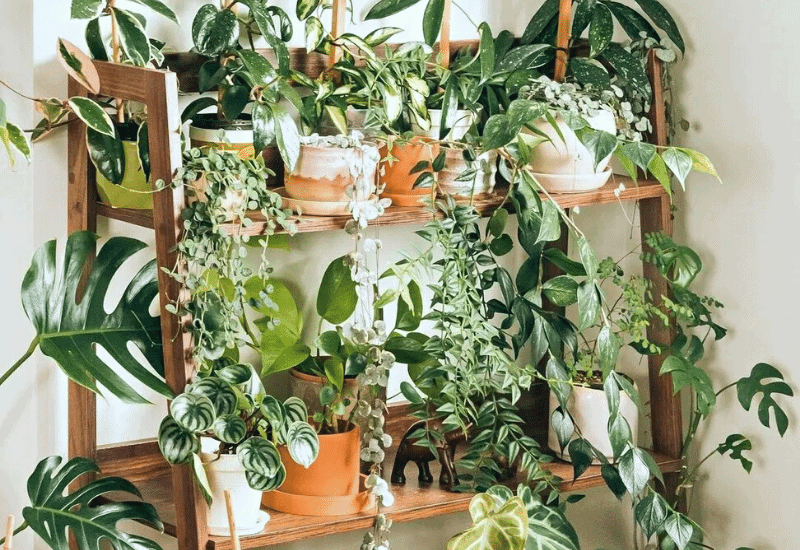
You don’t need settle for common and unimaginative houseplants when there are unusual, original, exotic and indeed very rare indoor plant varieties. These unique pieces will become real works to your indoor spaces that need sculptural quality and surprise factor to unique and stylish, with plants that look like pitchers, like stones, or with showy colors and shapes.
And from the black and Gothic bat flower to the sweet bunny succulent, there are so many eccentric varieties that you didn’t even know existed.
Till now, that is, because we want to show you the most unusual plants for your indoors spaces ever!
Let’s start straight away; first up, a very hungry and exotic plant you can grow indoors…
18 Very Cool and Unusual Houseplants for Your Indoor Spaces
Strange and surprising in their looks, these unique houseplants will bring a great touch of originality to your home or office.
1. ‘Diana’s Delight’ Pitcher Plant (Sarracenia ‘Diana’s Delight’)
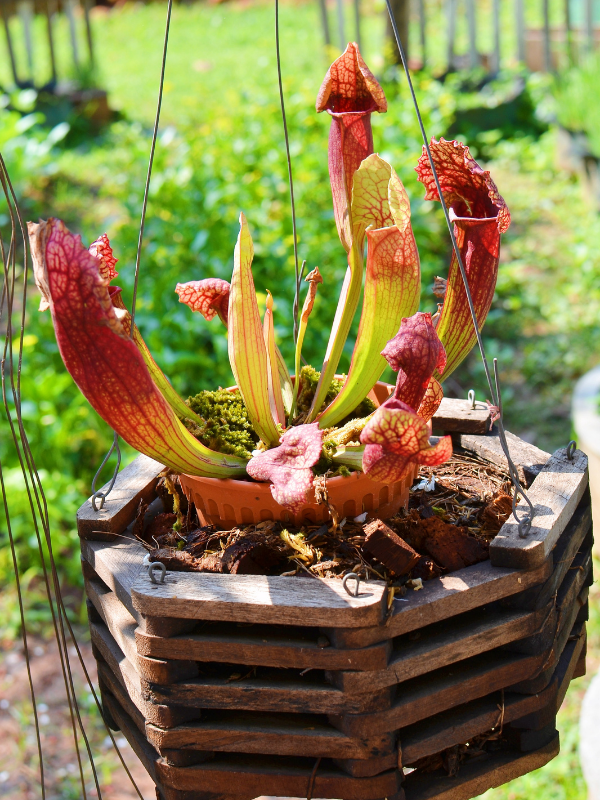
This carnivorous perennial is both unusual looking and very elegant. ‘Diana’s Delight’ has a straight and upright, slender pitchers of the brightest magenta pink shade, beautifully decorated with a pattern of darker veins that looks like an arabesque work of art.
The lids are also light and vibrant, being lightly frilled rather than flat. Of course, it will also capture little insects that visit your home, something very few other houseplants will do for you!
In the right conditions, it will also blooms, and the flowers are really strange too. With a nodding habit, they look like strange decorations, with a set of upper wings and at the top and then longer hanging sepals in the middle. They can range from lime green to purple in color.
‘Diana Delight’ pitcher plant has a very exotic and sculptural look, and in fact it may look like a ceramic vase; it will literally charm and amaze your guests, and children seem to love it a lot too.
2. Frizzle Sizzle Plant (Albuca spiralis)
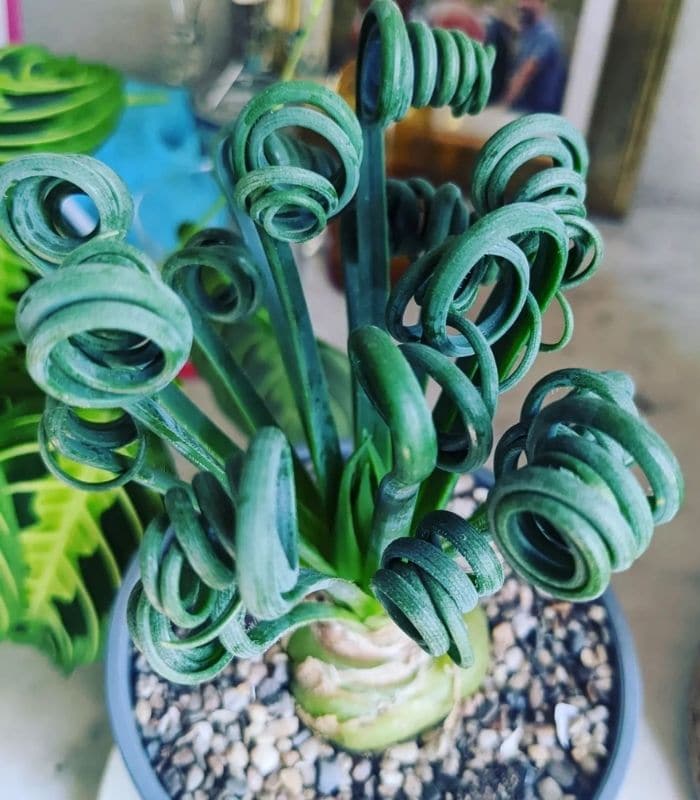
Frizzle sizzle plant has a fun loving look, because it really looks like it has no leaves, but actual springs instead.
Indeed, the foliage is long, thin, it comes straight from a large bulb that sticks out from the soil; each filament then just curls, like you would find in metal shavings, for example.
The lower part is straight and upright, but then, at the top it starts winding over an invisible cylinder. The blooms of this succulent are massive, really.
They are lime green to yellow and they come on long and thick stems. They have three back petals and then a central crown, vaguely reminiscent of narcissus flowers.
Frizzle sizzle plant is an easy to grow plant as well, so you don’t really need to work too much to have this weird looking green friend on your coffee table or bookshelf.
3. Black Bat Flower (Tacca chantieri)
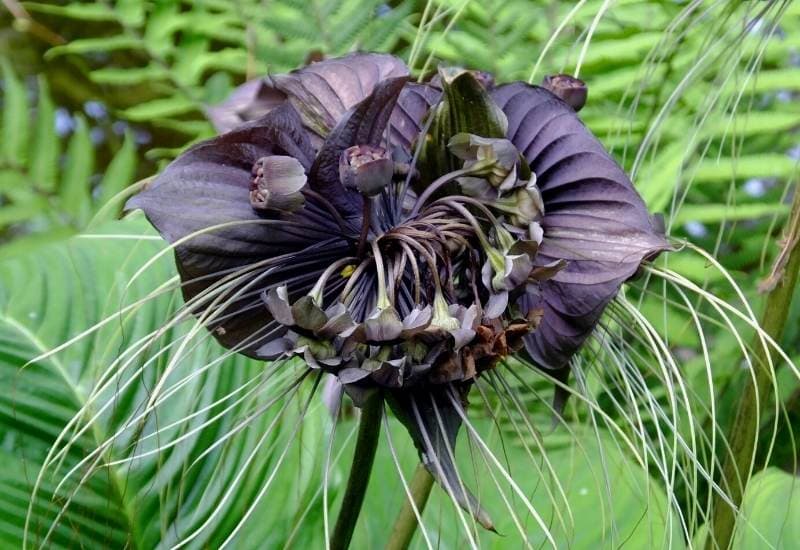
Black bat flowers is a rare Gothic beauty that only recently has made its entry into the list of plants you can grow indoors.
The blooms are really exceptional, so dark that they are almost black, with two large pointed bracts and filaments that grow from the middle, together with smaller florets. It looks a bit like the monster in the movie Alien.
The flowers are massive too, up to 1 foot across (30 cm)! The foliage is mid green broad, elliptical, large and very glossy too. Not as unusual and mind blowing as the blossoms, but still very decorative for elegant rooms and offices.
Black bat flower will require constant attention; it’s not the houseplant you can forget about. Having said this, it is now available from online and specialized garden centers, so, if you have the green thumb and you want a very weird black flower…
4. Living Stones (Lithops spp.)
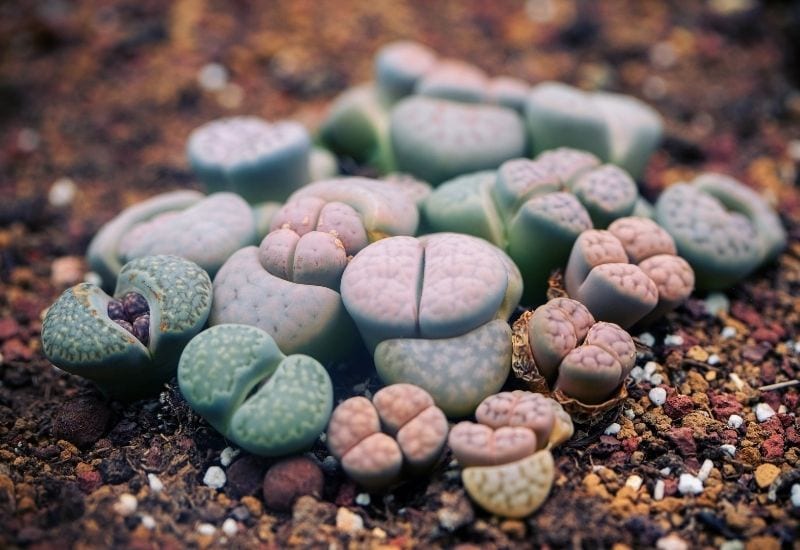
Living stones are so weird that don’t even look like houseplants at all. They are made up of two modified, very succulent leaves that look like pebbles.
These desert succulents grow among sand and rocks in very dry regions, and they are small and very colorful.
Depending in the species and varieties, they have an amazing palette of browns, reds, blues, oranges m grays and greens!
Often with beautiful patterns all over them, they look like decorative rocks you have found on a river bed… They are also still, meaning that they grow very slowly indeed, and this too makes the comparison with the mineral world very suitable indeed.
But there a little exception; when they bloom, they suddenly produce colorful and bright flowers, and sometimes these are bigger than the whole plant!
Living rocks are ideal for coffee tables and bookshelves; they are very forgiving and strong and you only need to water them little and sporadically.
5. Air Plant (Tillandsia spp.)
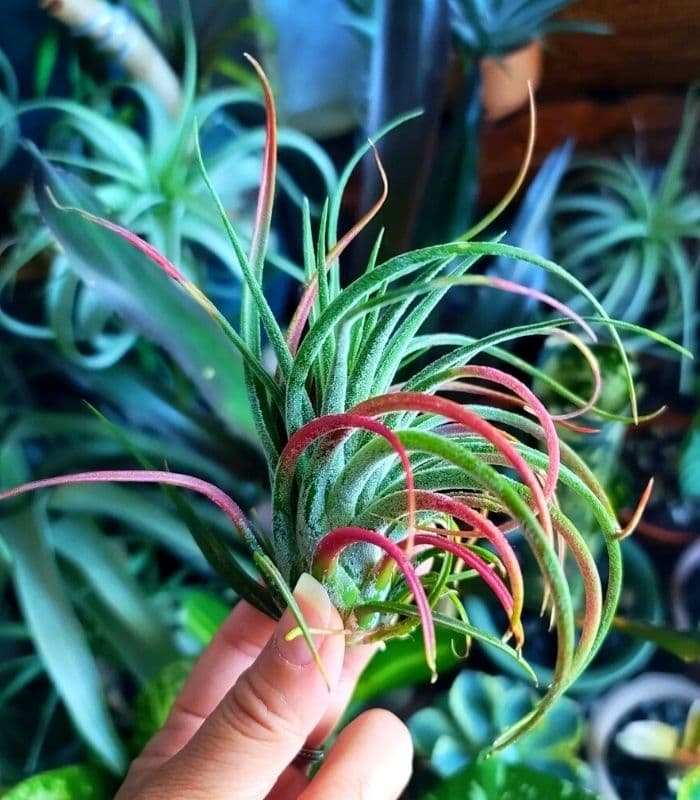
There are many varieties of air plant, and they all look strange and unusual indeed. To start with, they take their name from the fact that they do not grow in soil.
They are perfect to just attach to beams, furniture, even big decorative shells – and you can even out them upside down!
From there, they will grow their long and thin, sometimes arching leaves, and they will see, like strange creatures from outer space that found their way into your home. The blooms of these evergreen succulents are show stoppers too.
The flowers are long, tubular and blue violet in color but they are always surrounded by a series of modified leaves of the most amazing shades of pink, purple, red or orange too! And then, another strangeness of Tillandsia is that it has no roots at all…
Air plant is easy to grow and it allows you creativity with the setting, or planting as you would say with other plants. You can literally grow it on anything at all this makes it perfect to recycle antiques or beautiful but unused objects.
6. Wine Cup (Crassula umbella)
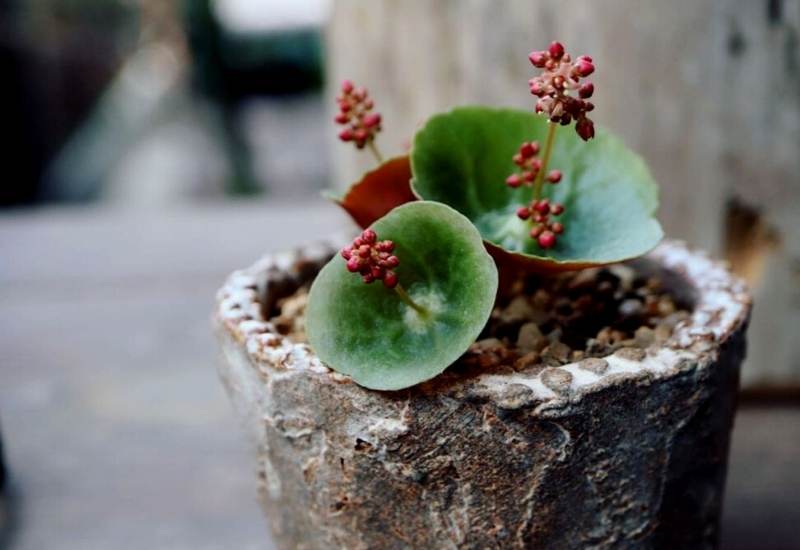
Wine cup is a houseplant that looks like a bowl, a saucer, or indeed drinking or eating vessel of some sort. In fact, it has broad, succulent round leaves with rims on the edges.
These are bright green, with a waxy texture and glossy sheen on them. Each plant will only produce a few of these oddly shaped leaves, resting on a short stem. In a way they may look like satellite disk station…
A stem with a spike of small but bright red flowers will come from the center of these to complete the effect.
Despite its very unusual appearance, wine cup is a very easy plant to grow. It is low maintenance and tough, and a perfect living statue for offices and living rooms.
7. Venus Fly Trap (Dionaea muscipula)
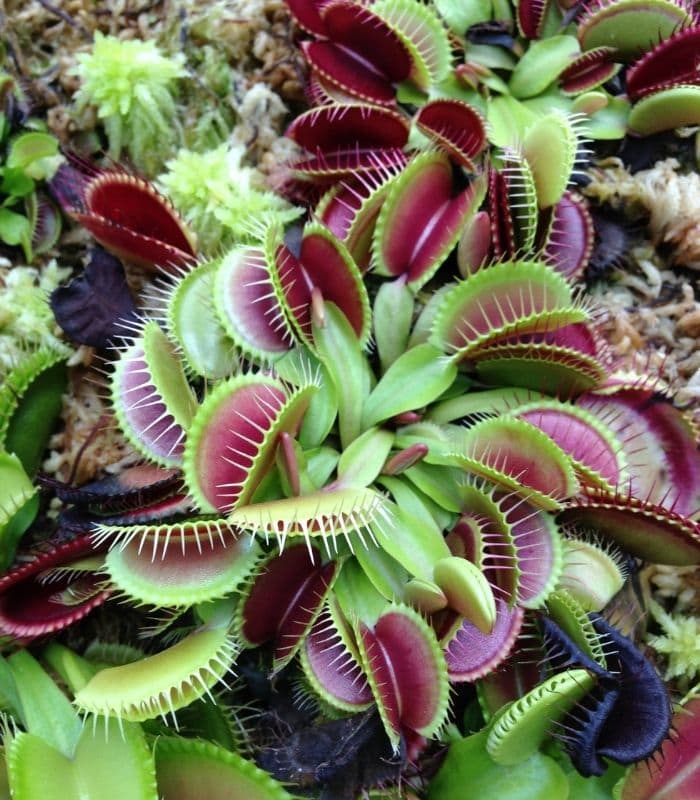
Venus fly trap is a famous carnivorous plant that’s becoming popular as a weird and dynamic houseplant. In fact, there are now many cultivars as well, giving an even bigger choice.
The modified leaves they use to catch insects with their sudden and quick movements have a. bright red inner part, spikes at the edges and they are bright green and glossy on the outside.
These are the main attraction of this hungry plant, but it also has a much gentler side… In fact, its blooms are candid snow white, star shaped, and they come in clusters on long upright stems once a year. This is a very cool and playful houseplant that children love especially; it is small, thus suitable for most indoor spaces, including little shelves and window ledges.
8. Jewel Orchid (Macodes petola)
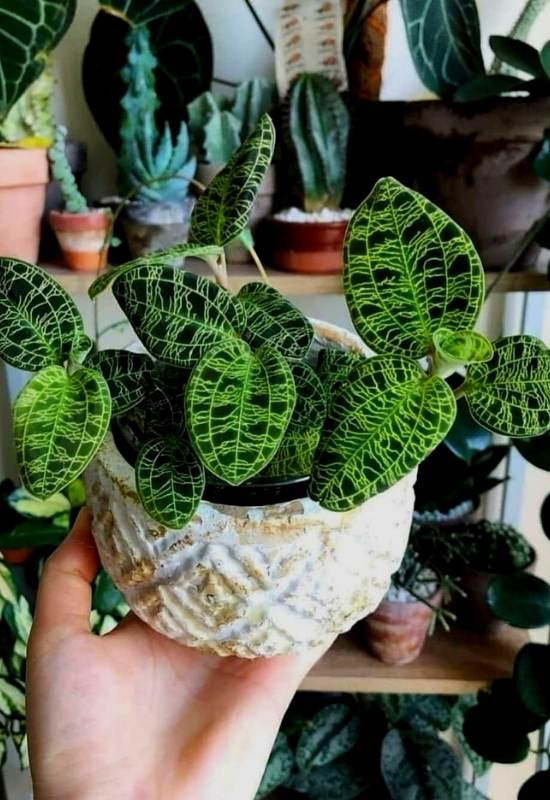
Original of South-East Asia, jewel orchid has the most amazing and unusual foliage you can imagine.
While other orchids will wow you with their blooms, this one will surprise you with its broad, elliptical leaves.
These have a dark and glossy green to brownish background, but with a very intricate and eye catching pattern of lines, like drawings of a much light shade, from lime green to white. It really looks like someone has embroidered the plant, with very fine artistry too.
The flowers are still pretty, but small, with a cream white labellum and yellow to brownish petals, coming in loose clusters on upright russet brown stems.
Jewel orchid is a lovely asset for any room; the patterns on the leaves will literally enchant you and anyone you invite round for coffee.
9. Marimo Moss Ball (Aegagropila linnaei)
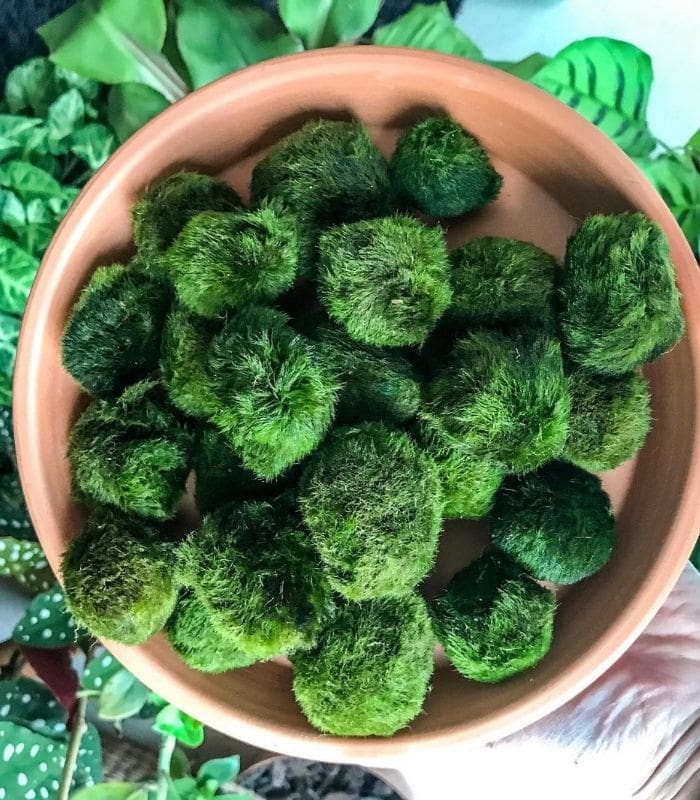
You don’t get any more unusual than a fluffy, spherical pompon with no roots and free rolling: and this is what marimo moss ball is like. Of a lovely deep and bright green color, the foliage is made up of thickly lacked filaments that form a perfect ball.
This is actually a rare alga species, and you will need to grow it in a bowl or aquarium. People like to create compositions with it. Just imagine it in a beautiful decorative vase it jugs, and add some colorful gravel to bring out the vibrancy of this plant’s color.
Marimo moss ball is so unusual that even normal guidelines don’t work; what you need to focus on is the water it grows in, not the soil.
10. Cooper’s Haworthia (Haworthia cooperi)
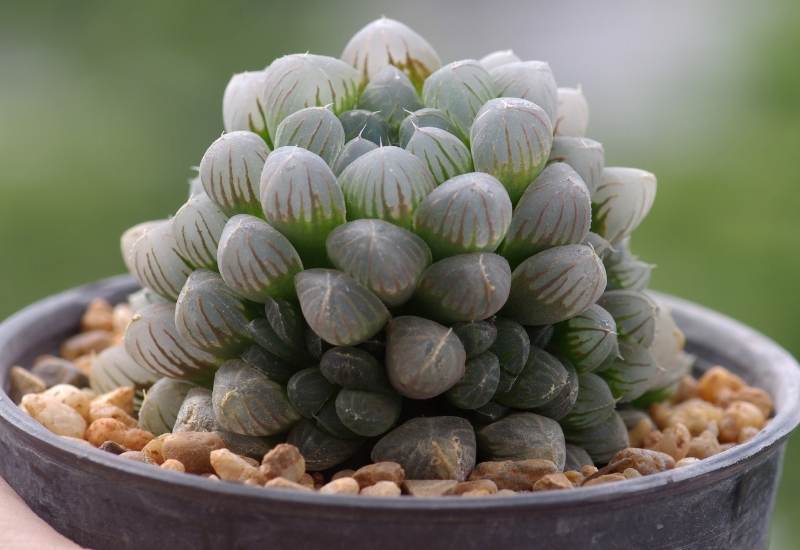
Cooper’s haworthia has a characteristic that makes it really original and flamboyant: it’s transparent. Yes, you can literally see through it. It is a small succulent with plump leaves that look a bit like elongated eggs, or candy.
They form lovely rosettes that grow straight from the soil. What is more, the surface is like glass, and the color ranges from blue to bright green, mainly with delicate patterns at the base of each small leaf. It gives your indoor spaces excellent light games, and it will also bloom. A long and thin spike with delicate looking, tubular and arched flowers will add an elegant touch to this weird houseplant.
Cooper’s haworthia is easy to grow and low maintenance; perfect for coffee tables and book shelves, you can be sure that your children will love this original houseplant.
11. Sundews (Drosera spp.)
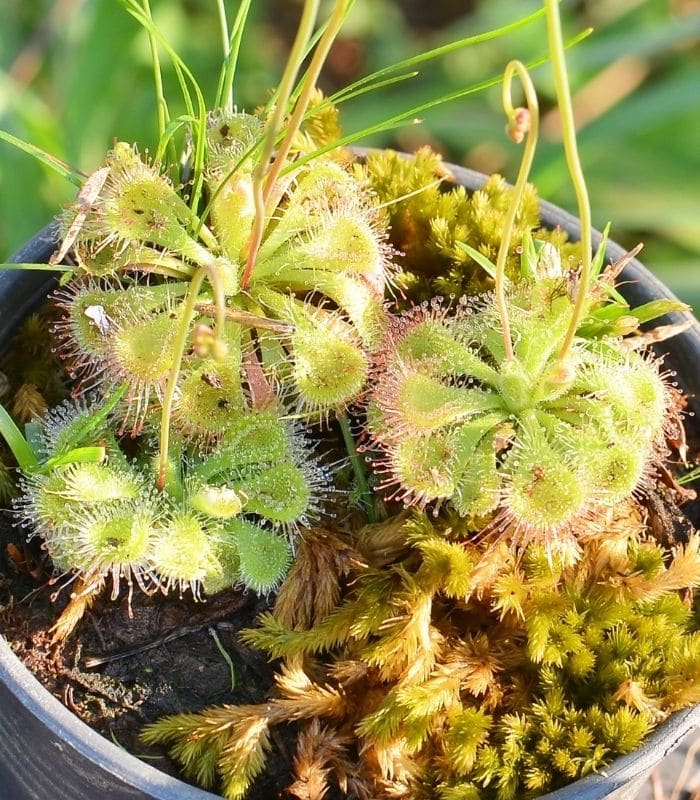
Sundews does not look like any other houseplant; this carnivorous tropical plant is like it is covered in constant droplets. But don’t be deceived; these are not made of water but of a sticky substance it uses to catch insects that venture onto it.
The leaves look like paddles, flat, broad and horizontal, like perfect landing places. They are yellow green and glossy, but covered in bright red hairs which curl when little legs stimulate them.
They are disposed in a rosette shape close to the soil. It will also give you beautiful white flowers with 5 petals and delicate golden pistils on a long stem once a year.
Sundews is a sticky but playful choice as houseplant; it is small and this makes it ideal for any space indoors, including shelves or little corners.
12. Hoya Hearts (Hoya kerrii)
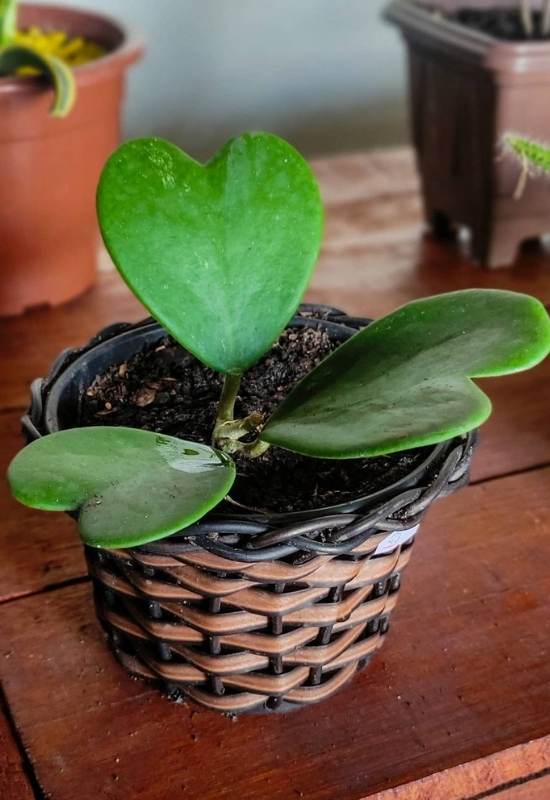
Native of South-East Asia, Hoya hearts is aptly name for the unusual shape of its leaves. Glossy light green and flat, they look like romantic jade pendants; we say “cordate” in gardening to mean heart shaped, but this plant excels in perfection on this point.
No wonder it is a common present for Saint Valentine’s Day… It is a succulent vine that you can easily prune and keep in small shape, and it is at its strangest when just planted; you will usually get two little hearts sticking out of the soil, before it actually vines.
It also produces round clusters of sugar looking star shaped flowers, white with a purple center.
Also called “lucky heart”, this houseplant is ideal for a loving thought with a twist for a dear one; easy to grow and low maintenance, it will not take up time and will stay as a memento for long.
13. Parachute Plant (Ceropegia sandersonii)
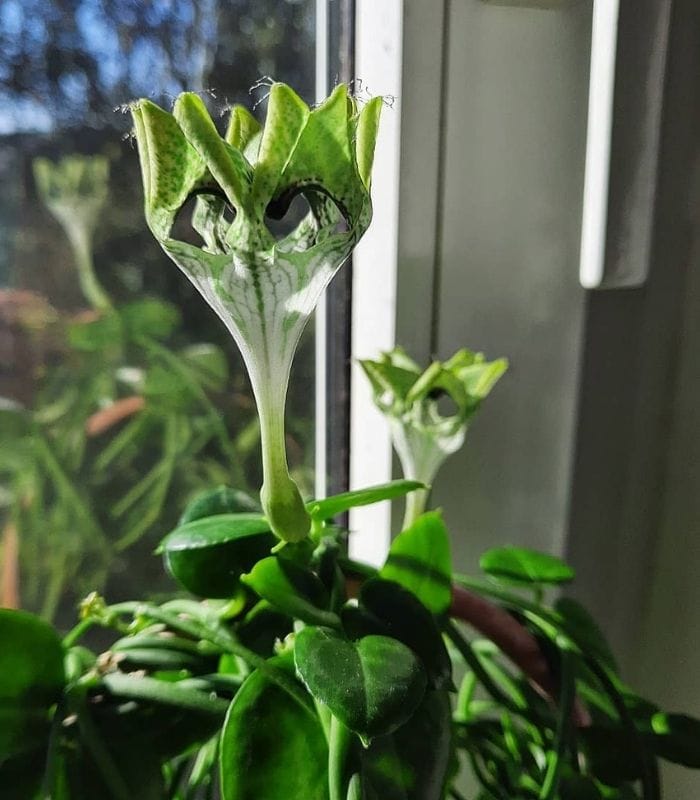
Parachute plant, a.k.a. African parachute or fountain flower is a surprising houseplant from Mozambique, South Africa and Swaziland. What makes this evergreen vine very unconventional indeed is the shape of its flowers. These can be 3 inches long (8.0 cm) and they grow looking up from delicate stems.
These have a funnel shaped part which is white but the opening is covered off by what looks like the ceiling of a gothic cathedral, star shaped, in five parts, with a lovely pattern of darker green dots on a brighter shade of the same color. Actually this lid on top changes shape as the flower opens and matures, at first, in fact, it looks like a parachute filled with air.
The flowers are sweetly scented and they have this shape to entrap flies… Yes, then, once they are covered in pollen, this plant will let them go. The leaves are mid green, ovate, succulent and sparse on the vine.
Parachute plant is rare and unusual choice for a houseplant; it will clearly set you apart as an original person.
14. Prayer Plant (Maranta leuconeura)
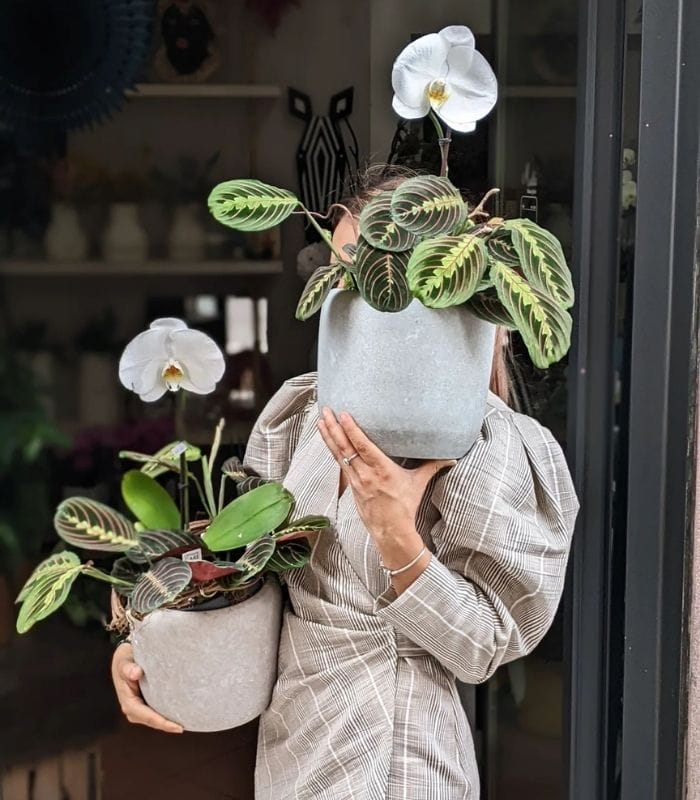
Prayer plant has exceptional and very eye catching patterns on its foliage, this makes it ideal to liven up indoor spaces.
The ovate, leathery leaves have a fish-bone pattern of pink purple veins that divide them into regular sectors.
To this, you need to add a bright lime green waving stripe in the middle sided by a very dark green area which then turns mid green towards the edges.
The undersides tend to be purplish in color. All glossy and very attractive indeed! They come on petioles that start straight from the soil, looking a bit like philodendron.
There are also cultivars like ‘Lemon Lime’ which much lighter and brighter shades than the mother species, including yellow.
Prayer plant is a very showy but small houseplant; you can easily have it on a table at home or in your office and it will brighten up your days with its colorful display.
15. Spiral Cactus (Cereus forbesii spiralis)
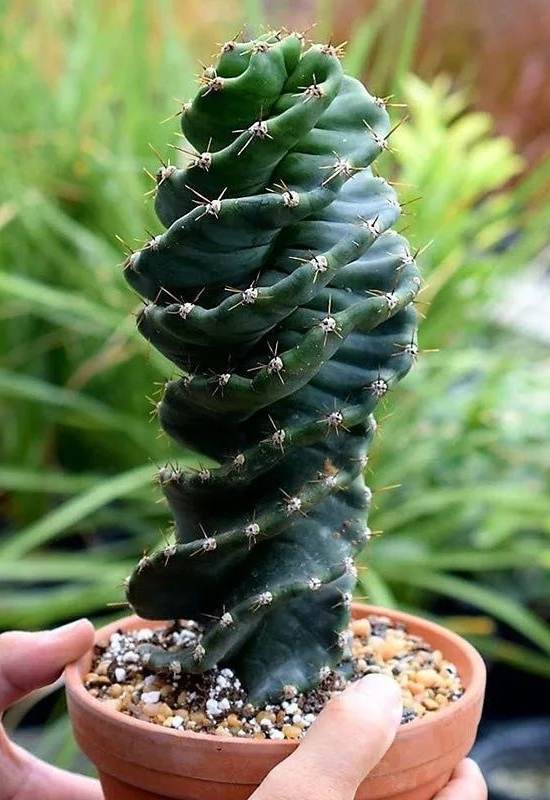
Spiral cactus is a houseplant with an unusual twist for you – literally! Like other plants in this genus (Cereus) which is very common, it has a deeply lobed, or grooved stem. But unlike its relatives, it literally spins into a spiral.
This makes it really interesting and totally surprising, but it also gives it a bigger sculptural and dynamic value compared with more common and less creative varieties.
The flowers are really showy too… With many, glossy waxy and hard looking petals like in many succulents, up to 8 inches across (20 cm) and snow white with pink purple dashes.
Spiral cactus is an intriguing choice as an indoor plant; it gives you an interesting swirling sculpture that also explodes in show stopping blossoms!
16. String of Pearls (Senecio rowelyanus a.k.a. Curio rowelyanus)
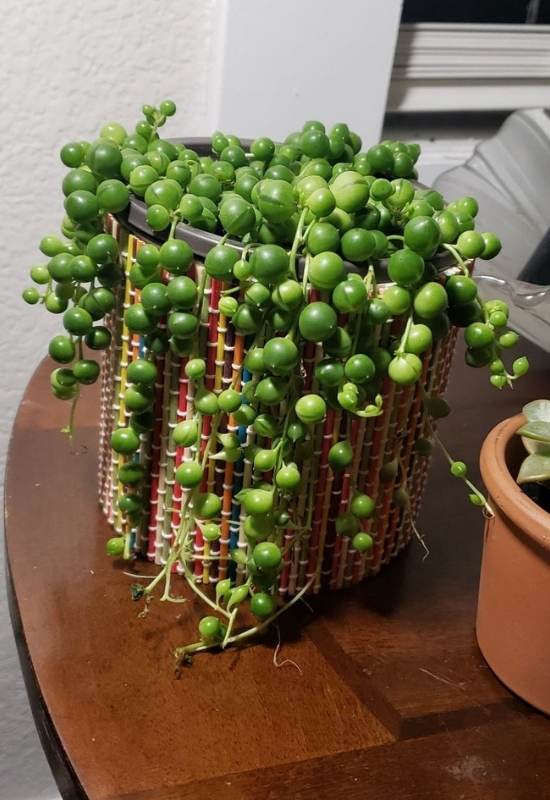
String of pearls is the ideal quirky and unusual houseplant for hanging baskets. This succulent has long and thin draping and trailing vines that grow downwards in straight strings. But it’s the very unusual shape of the leaves that makes it really unique.
They are literally and perfectly spherical. This is why it is compared to a necklace of pearls, or even of the beads of a rosary. They are usually pea green in color, but there are lovely variegated society with cream white or cream yellow parts too.
The blooms come in round clusters of snow white and star shaped, very bright little flowers; the central purple and gold reproductive apparatus sticks out from the middle adding a delicate touch.
String of pearls is very unusual and it is becoming popular just for this reason; however, do not grow it if you have children, because the leaves look like candy but the whole plant is absolutely toxic.
17. Rattlesnake Plant (Calathea lancifolia)
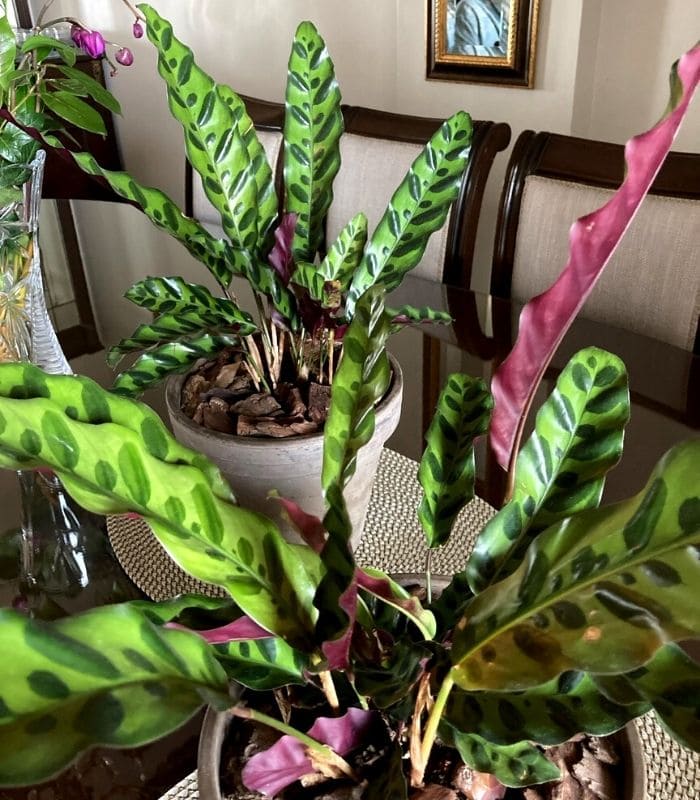
Rattlesnake plant, Calathea lancifolia, is a very weird and unusual looking plant for your indoor spaces.
The leaves look like the tails of rattlesnakes, hence the name, as you may have guessed. They are lance shaped, long and with wavy edges.
There is a mid-rib that runs along each one and there are darker oval shaped parches on a bright green background. Finally, the edges have a mid-green shade to define the shape of the foliage.
Look closely and you will also notice a crocodile skin pattern gently sketched on the very shiny surface as well.
Forming lovely clumps for indoor decoration, this is a really unique houseplant.
Keep the foliage shiny by cleaning it regularly if you want the best results and effect ever in your living room or office, and rattlesnake plant will become a green and exotic protagonist of indoor spaces.
18. Swiss Cheese Plant (Monstera adansonii)
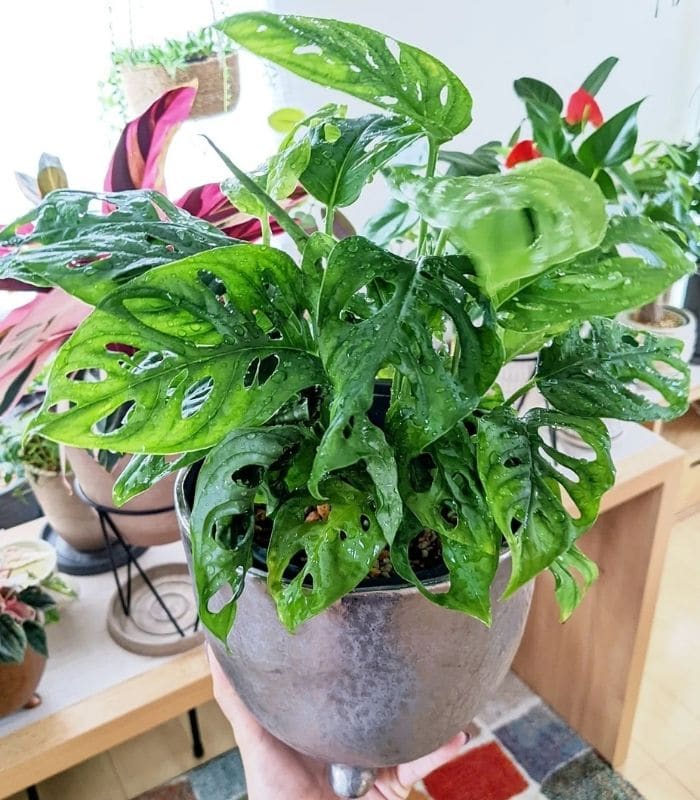
Swiss cheese plant is so strange that its scientific name calls it a “monster”, though it is really a beautiful houseplant from Central and South America.
The weird thing is that the broad, glossy and dark green elliptical leaves have oval holes in them. This may look strange to you but the fact is that they can reach an impressive 30 inches long (76 cm) and 20 inches wide (50 cm) so, they become like sails in the wind.
The cuts are there to avoid being ripped off by the wind. It will also bloom with a cream yellow spathe and spadix, like a peace lily, bit much bigger in size, though this is rare indoors.
The odd texture of the foliage of Swiss cheese plant make it a point of conversation with guests and neighbors when they come to visit your home or office for coffee.
Cool, Unusual and Beautiful Houseplants
From plants that look like bats, to houseplants that trap flies with very weird flowers, you have just met some of the most unusual, original but also beautiful varieties for your home, office or other indoor space.

Written By
Amber Noyes
Amber Noyes was born and raised in a suburban California town, San Mateo. She holds a master’s degree in horticulture from the University of California as well as a BS in Biology from the University of San Francisco. With experience working on an organic farm, water conservation research, farmers’ markets, and plant nursery, she understands what makes plants thrive and how we can better understand the connection between microclimate and plant health. When she’s not on the land, Amber loves informing people of new ideas/things related to gardening, especially organic gardening, houseplants, and growing plants in a small space.
